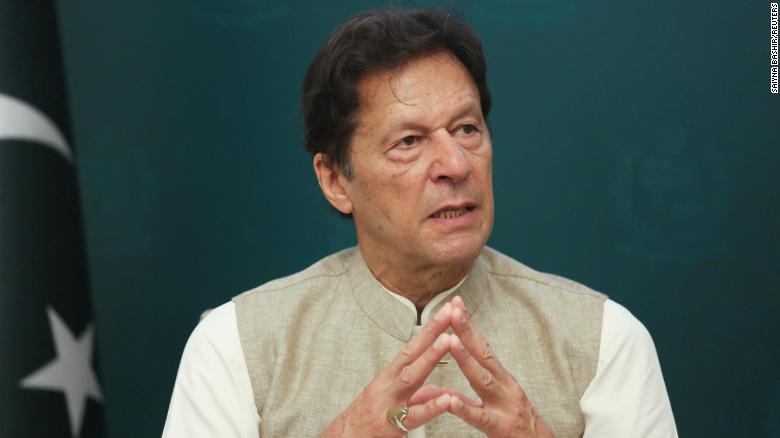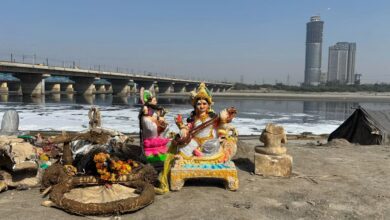
Islamabad, Pakistan (CNN) – Pakistan is in political turmoil as the South Asian country awaits a key court ruling that will decide whether embattled Prime Minister Imran Khan’s plan for an early election can go ahead.
Khan called the election in a dramatic attempt to cling to power after the deputy speaker of parliament blocked a no-confidence motion against him last Sunday that had appeared almost certain to succeed.
That move, and Khan’s subsequent dissolution of parliament, enraged an opposition that for months have been demanding his removal over claims of poor governance and economic mismanagement.
The opposition responded by accusing Khan of treason and asking the country’s highest court to rule on whether the Prime Minister had breached the constitution. The court battle is the latest escalation in a crisis that has been smoldering for weeks, with Khan already having lost the backing of key political allies and the country’s powerful military.
Khan’s main hope now appears to be that his enduring popular appeal with voters — fueled by his stellar former cricket career, his unique brand of Islamic populism and his claims of foreign interference in Pakistan’s affairs — can keep him in the driving seat.
But an unfavorable ruling by the Supreme Court — which resumes its hearing on Tuesday — would leave Khan’s leadership hanging by a thread.
Why is Khan in trouble?
Pakistan, a nation of 220 million, is notoriously hard to govern. It has struggled with political instability since its formation in 1947 with multiple regime changes and military coups. No Prime Minister has ever completed a full five-year term.
Khan’s problems date back to 2018, when he rose to power in an election mired in accusations of vote-rigging and foul play.
More recently, he has been dogged by claims of economic mismanagement. The cost of basic necessities such as food and fuel are skyrocketing, with inflation in the double digits, and the government’s foreign exchange reserves are fast depleting.
Some members of Khan’s coalition government had deserted him over his perceived failure to work with them and he has alienated the military — long a kingmaker in the country’s politics — that once supported him.
On March 8, the opposition filed for a no-confidence vote to be held in parliament as they urged Khan to resign. The Prime Minister’s subsequent actions have only fueled his critics, with opposition leader Shehbaz Sharif calling them “nothing short of high treason.”
Why has the military abandoned Khan?
Pakistan’s military, which has long influenced foreign policy, appears to have been angered by a series of diplomatic moves by Khan that have shifted the country away from the United States and closer to China and Russia.
For much of his term, Khan has pushed anti-American rhetoric, blaming the US for the situation in Afghanistan. In a sign of how frayed relations have become, US President Joe Biden and Khan have not spoken since Biden took office last year.
Pakistan’s Imran Khan says world should give Taliban ‘time’ on human rights but fears ‘chaos’ without aid
In a move that further distanced Pakistan from the US, Khan recently refused to condemn Russia’s invasion of Ukraine, even meeting Russian President Vladimir Putin in Moscow the day Russia began its war.
The military has appeared to clash with Khan on these issues. In an April 2 speech, Pakistan’s Chief of Army Staff, Gen. Qamar Javed Bajwa, said the country shared “a long history of excellent relationship with the United States.” Maintaining relations with Washington was “vital” to Pakistan’s national interests, he added.
“Russian aggression on Ukraine is very unfortunate. This is a huge tragedy,” Bajwa said. “Pakistan desires immediate cessation of hostilities between Russia and Ukraine and is doing everything it can to resolve the issue.”
Despite this, the military says it has “absolutely no” connection to the current crisis, which it described as “purely a political matter.”
How has Khan responded?
Throughout the crisis, Khan has rejected criticism of his leadership.
Instead — and without offering evidence — he has repeatedly claimed the moves against him are an attempt at regime change backed by Washington and some members of the opposition.
Both the US State Department and Pakistani opposition have denied Khan’s allegations.
But when Khan called for parliament to be dissolved and an early election to take place, the deputy speaker — who was appointed by Khan — justified the move on the basis of an alleged “foreign conspiracy.”
For now, Khan remains in power. Last Sunday, Pakistan’s information minister said Khan will continue with his responsibilities under the rules of the constitution.
But his future as Prime Minister will depend largely on the Supreme Court ruling and whether an early election can go ahead.
What could the Supreme Court decide?
Analysts say there could be three possible outcomes.
The first — most favored by the opposition — is that the court says the dismissal of the no-confidence vote was unconstitutional and overturns Khan’s decision to call for an early election. If this happens, Khan could once again face a no-confidence vote he is widely expected to lose.
In a second scenario, the court may rule Khan’s move was unconstitutional but refuse to restore the assembly, arguing it lacks jurisdiction to do so. In this scenario, an early election could go ahead anyway.
A third potential outcome could see the court decline to make a ruling, effectively upholding Khan’s actions and paving the way for early elections.
If Khan prevails, Pakistan could head to the polls within 90 days.
Would Khan win a snap election?
Some 16 years after becoming a lawmaker, Khan was elected Prime Minister in 2018, vowing to eradicate poverty and corruption and promising a “new Pakistan.”
He has enjoyed widespread popular support since then, with tens of thousands taking to the streets in the capital, Islamabad, in recent days to support him.
Khan’s allegations of foreign interference appear aimed at shoring up his support among a public in which anti-American sentiment can sometimes run strong.
Ahmed Bilal Mehboob, director of the Pakistan Institute of Legislative Development and Transparency, said this would be a “tough” move for the opposition to counter.
“He’s a great orator. Still a large number of people continue to support (Khan). This is populism in its full glory,” Mehboob said.
Khan has dialed things up with repeated calls for his supporters to rally in Islamabad. He has also accused the opposition of corruption.
“We have made the decision to dissolve (parliament) because ever since I came to power I was being asked to resign,” he said in an address to the nation on Monday.
Still, Surya Deva, a professor at Macquarie Law School in Sydney, said Khan’s move for an early election could backfire. Khan has “not been able to manage the economy well and with a growing rift with both external and internal allies, even elections will not be easy for him,” Deva said.
CNN’s Sophia Saifi wrote from Islamabad and Rhea Mogul wrote from Hong Kong.




